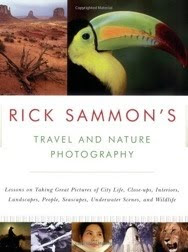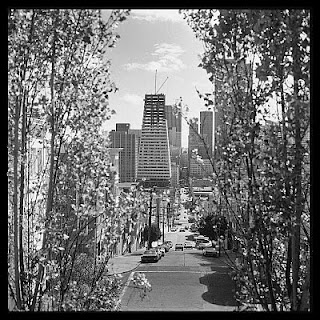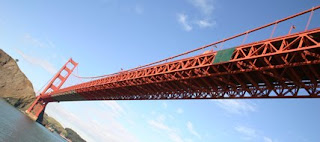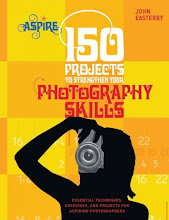Sorry to have dropped out for so long. I moved and there were so many things to take care of. I am back on track and will continue with the projects.
Unfortunately, I am still on the section "Learning to See Photographically". Next up, Project 11: Practice Daytime Long Exposure.
Friday, June 25, 2010
Friday, April 30, 2010
Project 10: Practice guessing the light meter reading
"Project 10: Practice guessing the light meter reading" is a time consuming and difficult prospect. It is best to do this with subjects that are static, such as landscapes or still-life.
On a recent trip to Roaring Camp, California to ride in an authentic logger steam train, I decided to try my hand at only shooting in full manual mode to force myself to hand focus and guess the needed light meter reading.
Needless to say, this was extremely difficult in an already difficult shooting situation.
Saturday, April 24, 2010
Project 9: Don't let the camera rule you
In "Project 9: Don't let the camera rule you", we are told to practice using our camera in Manual Mode and experiment with over/under exposure. Ideally, learning to be "more confident with what your eyes tell you."
The following were all shot in Manual Mode this morning in Golden Gate Park. Exposure settings are indicated below each:
ISO 100 1/125 f/5.6 300mm
ISO 100 1/1000 f/5.6 133mm
ISO 100 .4 f/29 90mm
ISO 100 1/40 f/5.6 90mm
ISO 100 1/50 f/5.0 64mm
All images processed in Photoshop for exposure/color and sharpening ONLY.
Impressions: I think this lesson is very important in developing skill with your camera. It is also important to spend a great deal of time learning exposure and your camera. The necessity of knowing what exposure to use in any given situation can mean the difference in getting the shot, or not.
Saturday, April 17, 2010
Project 8: Give Your On-Line Account a Professional Edge
Project 8: Give Your On-Line Account a Professional Edge.... in other works, don't make it personal and don't put everything on the site.
Alright, I'll admit it. I have much too much personal information on my website and seriously too many photographs. But this is because the website wasn't originally a portfolio. It was a personal site from way back before there were FaceBooks and Twitters, and such things as these.
"Only show consistent standard of photos", says Mr. Easterby. By the end of this project (or 150 projects), this is exactly what my online identity will be.
The FaceBook and Flickr accounts are more or less up to snuff:
That is the whole purpose behind this project, after all. Well, besides talking to myself (is anyone listening to me?).
Next Week:
New Chapter: Uses of Photography
Where we will finally begin the practical educational projects! Starting with Project 9: Practice Guessing the Light Meter Reading.
Alright, I'll admit it. I have much too much personal information on my website and seriously too many photographs. But this is because the website wasn't originally a portfolio. It was a personal site from way back before there were FaceBooks and Twitters, and such things as these.
"Only show consistent standard of photos", says Mr. Easterby. By the end of this project (or 150 projects), this is exactly what my online identity will be.
The FaceBook and Flickr accounts are more or less up to snuff:
That is the whole purpose behind this project, after all. Well, besides talking to myself (is anyone listening to me?).
Next Week:
New Chapter: Uses of Photography
Where we will finally begin the practical educational projects! Starting with Project 9: Practice Guessing the Light Meter Reading.
Project 7: Start an On-Line Account
Project 7: Start an On-Line Account using Flickr, Facebook, etc.
Well, that was easy!
I've already done this and have been busy integrating them. Here's what we have so far:
FaceBook
Flickr
Twitter
BrianLeadingham.com
I have even created a new logo:
When setting up on-line accounts, it is important (according or instruction manual here) to display only your best work. This is where I get into trouble. What I think is the best, and what everyone else thinks....well, you know.
Also, I have a tendency to over saturate with every photograph I like. Instead, I am going to work on narrowing this down as instructed by Mr. Easterby's book, "you should make sure that what your present is something you are happy for others to see."
Well, that was easy!
I've already done this and have been busy integrating them. Here's what we have so far:
Flickr
BrianLeadingham.com
I have even created a new logo:
When setting up on-line accounts, it is important (according or instruction manual here) to display only your best work. This is where I get into trouble. What I think is the best, and what everyone else thinks....well, you know.
Also, I have a tendency to over saturate with every photograph I like. Instead, I am going to work on narrowing this down as instructed by Mr. Easterby's book, "you should make sure that what your present is something you are happy for others to see."
Project 6: Compile a Series of Leisure Images
Project 6, probably the first real project, instructs us to shoot a series of photographs in a public environment where "people have fun".
We should have a series of 12 images which depict the following:
1. People
2. Places
3. Abstract
I chose Crissy Field and the Marina Green as my locale.
I can't say I did very well:








We should have a series of 12 images which depict the following:
1. People
2. Places
3. Abstract
I chose Crissy Field and the Marina Green as my locale.
I can't say I did very well:








Some of the images are "okay" by themselves. Most are crap! Together however, I think I would have failed this assignment in class. But since it was "due" today, I turned it in anyway!
Sunday, April 11, 2010
Travel and Nature Photograhy
I am currently reading, Travel and Nature Photography by Rick Sammon. On Chapter three and already found it more than informative:
Get yours here:
________________________________________
The weather was horrible today, but I will return the "Projects" this week with "Project 6: Compile a Series of Leisure Photographs" and I am already working on "Project 7: Start an On-Line Photo Account".
Check back soon to see how it is going.
Friday, April 9, 2010
Project 5: Build a Scrapbook
In order to photograph well, we must understand and study what makes a good photograph. And thus, Project 5: Build a Scrapbook.
Now, this is not your grandmother's scrapbook or even your little sister's scrapbook. This is where you should collect copies of photographs you find interesting or worth studying. These can be from anywhere: internet, magazines, or even your own.
For the sake of this blog, I am going to make my scrapbook right here...in this blog. I will publish, re-tweet, FaceBook, Flickr, etc. all of the things I feel noteworthy here as an ongoing (and online) scrapbook.
To start, I am going to list these as some of my current interesting photographs, all of which I am currently studying for their merit:
http://www.flickr.com/photos/stuckincustoms/2035748576/
http://www.flickr.com/photos/13077014@N06/3179424598/
http://www.flickr.com/photos/buckielugger/4457250359/
http://www.flickr.com/photos/breakdennis/3417964398/
http://www.flickr.com/photos/sieren/4186946464/in/photostream/
As the Projects continue, I will post Blog entries of each of the photographs I like and details for each.
Check back real soon for Project 6: Compile a Series of Leisure Images
Now, this is not your grandmother's scrapbook or even your little sister's scrapbook. This is where you should collect copies of photographs you find interesting or worth studying. These can be from anywhere: internet, magazines, or even your own.
For the sake of this blog, I am going to make my scrapbook right here...in this blog. I will publish, re-tweet, FaceBook, Flickr, etc. all of the things I feel noteworthy here as an ongoing (and online) scrapbook.
To start, I am going to list these as some of my current interesting photographs, all of which I am currently studying for their merit:
http://www.flickr.com/photos/stuckincustoms/2035748576/
http://www.flickr.com/photos/13077014@N06/3179424598/
http://www.flickr.com/photos/buckielugger/4457250359/
http://www.flickr.com/photos/breakdennis/3417964398/
http://www.flickr.com/photos/sieren/4186946464/in/photostream/
As the Projects continue, I will post Blog entries of each of the photographs I like and details for each.
Check back real soon for Project 6: Compile a Series of Leisure Images
Thursday, April 8, 2010
Saturday, April 3, 2010
Project 4: Shoot on a Cell Phone
I suppose it really should be "Shoot WITH a Cell Phone". But I digress....
Pretty self explanatory. Go out into the world with a preconceived theme and edit down to the strongest 12 images. And so I did.
"Flowers of the Richmond District":




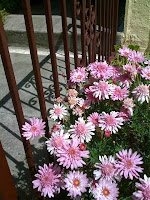




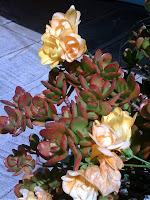
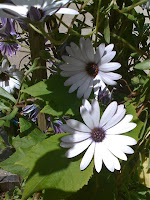

Here we should be learning to see the images around us without focusing too much on the technology involved. Also, to never miss a photographic opportunity as 21st Century technology allows us all to take good photographs with modern cell phone technology.
Remember however, pushing the "click" button doesn't make it a photograph. Composition is still important.
Sunday, March 28, 2010
Project 3: Do your homework
Last of the (non-project, projects):
These first three "projects" should really have been just an introductory chapter. But this last one is designed to get the photographer to understand the importance of other photographic works and the photographers who created them.
We are instructed to "spend time in a good bookstore or library". I am sure that's not meant the way it sounds....you dirty minded people (and Republican Senators).
But hey, that's how I found this book! In addition to learning 'how" to photograph, it is also necessary to understand "why" to photograph and how others see their imagery. According to Easterby, we should not only become familiar with the work of other photographers, but also "to consider carefully what each photographer has to say about their work."
I'd like to also add the Internet to Mr. Easterby's list of places to study other photographers, as well as various magazine publications.
Here are some of the photographers I study:
Ansel Adams (of course)
QT Luong (the first photographer to photograph all 58 National Parks), on display at the National Gallery http://www.terragalleria.com
Rick Sammon: http://www.ricksammon.com
Steve Sieren: http://www.sierenphotography.com/
Gary Hart: http://www.garyhartphotography.com
Next week, we'll return to the Projects with the first of the real world applications and "assignments".
These first three "projects" should really have been just an introductory chapter. But this last one is designed to get the photographer to understand the importance of other photographic works and the photographers who created them.
We are instructed to "spend time in a good bookstore or library". I am sure that's not meant the way it sounds....you dirty minded people (and Republican Senators).
But hey, that's how I found this book! In addition to learning 'how" to photograph, it is also necessary to understand "why" to photograph and how others see their imagery. According to Easterby, we should not only become familiar with the work of other photographers, but also "to consider carefully what each photographer has to say about their work."
I'd like to also add the Internet to Mr. Easterby's list of places to study other photographers, as well as various magazine publications.
Here are some of the photographers I study:
Ansel Adams (of course)
QT Luong (the first photographer to photograph all 58 National Parks), on display at the National Gallery http://www.terragalleria.com
Rick Sammon: http://www.ricksammon.com
Steve Sieren: http://www.sierenphotography.com/
Gary Hart: http://www.garyhartphotography.com
Next week, we'll return to the Projects with the first of the real world applications and "assignments".
Project 2: Your mind as a cognitive camera
So Project One didn't take long. Here is Project Two:
"Imagine that you have a camera inside your head and that your eyes are the shutter."
Here we are supposed to learn to look for opportunities for good photographs and to be subjective about when to snap the shutter.
To illustrate his point, Mr. Easterby gives an example like this: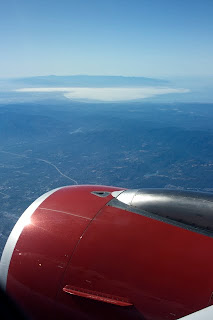
"Try to spot interesting photographic scenes, such as this horizon through the plane window."
I'm sure you are saying, "Well isn't that what photography is?"
The answer is yes. But unfortunately, most people don't seem to know the difference between the horrid little snap shots they take with their cell phones and post on the internet and "photography".
"Imagine that you have a camera inside your head and that your eyes are the shutter."
Here we are supposed to learn to look for opportunities for good photographs and to be subjective about when to snap the shutter.
To illustrate his point, Mr. Easterby gives an example like this:

"Try to spot interesting photographic scenes, such as this horizon through the plane window."
I'm sure you are saying, "Well isn't that what photography is?"
The answer is yes. But unfortunately, most people don't seem to know the difference between the horrid little snap shots they take with their cell phones and post on the internet and "photography".
Project 1: Practice framing your scene
The first project is to put your fingers together in a rectangle and practice seeing only an area of a scene, and then to try both vertical and horizontal, "to see if the shot will work or not before taking a picture."
Here is Shia Labeouf helping to illustrate the point...and looking fabulous doing it!
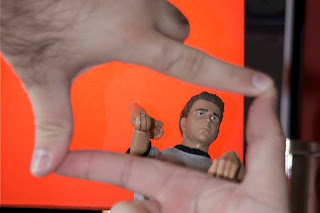
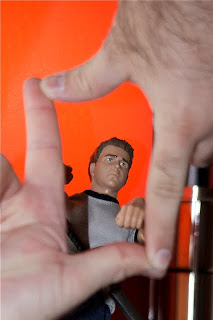
Okay, at first this seems rather mundane and silly. But the reality is that we too often forget to consider ONLY an area of what we see with our eyes. This is the one thing that annoys me most when I see people taking pictures with their cell phones WAAAAAYYYY out in front of their faces, more focused on working the phone than the scene (my friend Christopher being the exception of course).
Or worse yet, those people you see sticking their heads out of cars or while riding bikes snapping away randomly. I'm sure they eventually get a good picture...but why am I forced to see all of them on FaceBook?
Now you don't REALLY need to put your fingers out in front of you to get the point. The point is, simply look at areas of your total scene and consider cropping to that area before snapping the photograph.
If anything, this project illustrates one good point: try to get the right photo from the camera FIRST, without having to edit, crop, photoshop later.
Here is Shia Labeouf helping to illustrate the point...and looking fabulous doing it!


Okay, at first this seems rather mundane and silly. But the reality is that we too often forget to consider ONLY an area of what we see with our eyes. This is the one thing that annoys me most when I see people taking pictures with their cell phones WAAAAAYYYY out in front of their faces, more focused on working the phone than the scene (my friend Christopher being the exception of course).
Or worse yet, those people you see sticking their heads out of cars or while riding bikes snapping away randomly. I'm sure they eventually get a good picture...but why am I forced to see all of them on FaceBook?
Now you don't REALLY need to put your fingers out in front of you to get the point. The point is, simply look at areas of your total scene and consider cropping to that area before snapping the photograph.
If anything, this project illustrates one good point: try to get the right photo from the camera FIRST, without having to edit, crop, photoshop later.
Saturday, March 27, 2010
The Beginning
Hello,
Welcome to my great experiment. With this Blog, I am going to attempt to follow the advice from a book called, "150 Projects to Strengthen You Photography Skills" by John Easterby.
In much the same way a Julie Powell did with the "Julie & Julia Project" where she cooked her way through Julia Child's "Mastering the Art of French Cooking"; I am going to complete the 150 projects suggested in this book while Blogging about the experience and posting the results.
I am giving myself a full year to complete the tasks, which will allow me to advantage of a full year of different types of outdoor lighting.
Follow me on my journey to better photography:
Subscribe to:
Posts (Atom)

















